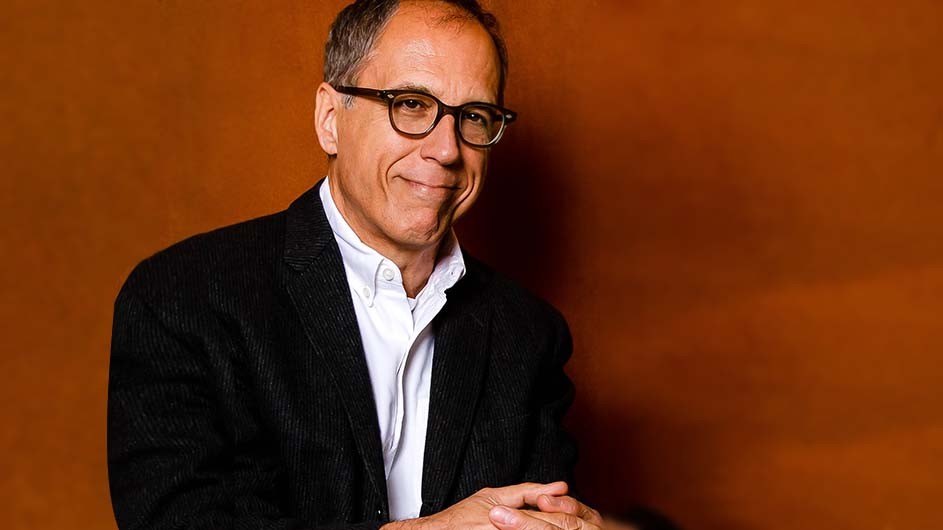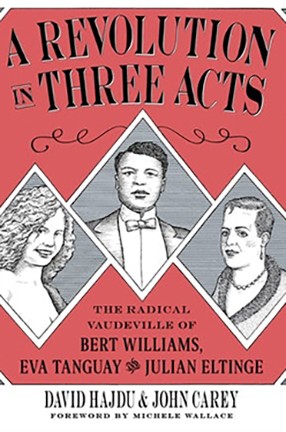How Three Vaudeville Stars Radically Changed American Culture
David Hajdu draws parallels between the early 20th century and current questions of race, gender, and sexual identity in his new book.

Bert Williams—a Black man forced to perform in blackface who challenged the stereotypes of minstrelsy. Eva Tanguay—an entertainer with the signature song “I Don’t Care,” who flouted the rules of propriety to redefine womanhood for the modern age. Julian Eltinge—a female impersonator who entranced and unnerved audiences by embodying the feminine ideal Tanguay rejected. At the turn of the 20th century, they became three of the most provocative and popular performers in vaudeville, the form in which American mass entertainment first took shape.
A Revolution in Three Acts, the new book by Columbia Journalism School Professor David Hajdu, explores how these vaudeville stars defied the standards of their time to change how their audiences thought about what it meant to be American, to be Black, to be a woman or a man. Hajdu and the artist John Carey collaborate in this work of graphic nonfiction, crafting powerful portrayals of Williams, Tanguay, and Eltinge to show how they transformed American culture.
Hajdu recently discussed the book with Columbia News, as well as the parallels between vaudeville and You Tube, which books he’s read lately and which ones he recommends, and what he’s looking forward to culturally in New York this fall.
Q. How did you come up with the idea for this book?
A. Whenever I'm working on a book, I find the idea for the next one—or several ideas for future books—in the research for the one I'm in the midst of. It's like taking a long road trip, and you drive by a diner with a sign that says, "Best Shoofly Pie in the World," and you think, "Well, I'm going to have come back here for that."
In 2016, I wrote a history of popular music in America called Love for Sale, and it included a bit about vaudeville and Eva Tanguay, as well as the horrors of blackface, and that made me want to come back to those subjects and treat them more thoroughly.

Q. Did recent events/movements (namely, Black Lives Matter and Me Too) influence the book, or are the parallels between then and now in terms of race, gender, and sexual identity purely coincidental?
A. I first conceived A Revolution in Three Acts and outlined it in detail about five years ago, so I wasn't thinking in those terms, no. But the issues of racial, sexual, and gender injustice are central to the book—they're at the heart of the story of Eva Tanguay, Bert Williams, and Julian Eltinge. In my mind, I just wasn't framing those themes in the language we now use.
Q. Is there any form of current entertainment that is akin to vaudeville?
A. In superficial ways, yes. You Tube is a forum for entertainment of almost every conceivable kind, just as vaudeville was a hundred years earlier. The big difference is that the variety that defined vaudeville was in full force in every theater every night. The audience wasn’t splintered into countless smaller groups of people focused on their own interests, as we are today. Every person who experienced vaudeville experienced all that it contained—comics and clog dancers, performers in blackface and whiteface, acrobats and tenors, and female impersonators.
Q. What are you most looking forward to about New York's fall cultural season in terms of music and theater? Will you be attending any live events?
A. The Village Vanguard is opening again, so I'm set for the season. Eric Harland, the drummer, will be there in October, playing for the first time as a bandleader. I'm beyond excited.
Q. What was the last great book you read, and why?
A. I just finished a brilliantly original, rich, and quirky book by Barnard Professor Rachel Eisendrath, a Renaissance scholar, called Gallery of Clouds. It's ostensibly a book-length essay about Arcadia, a 16th-century pastoral by Sir Philip Sidney. But it's really about illusions and literature and New York, three of my favorite topics, and the writing is gorgeous.
Q. Any reading recommendations?
A. For research for A Revolution in Three Acts, I read Claude McKay's Home to Harlem, which I had inexplicably missed before then, and I loved it so much I read two more McKay novels, Amiable with Big Teeth and Romance in Marseille, right away. I keep the collected poems of Elizabeth Bishop on my nightstand, and read the volume over and over. For nonfiction, I always recommend Terry Castle. If you haven't read The Professor, you should drop whatever you're reading and start it now.
Q. What are you teaching this semester?
A. I'm teaching the Seminar in Arts and Culture at the Journalism School. It's part of the MA program for advanced students—a serious challenge for everyone involved, including me.
Q. You're hosting a dinner party. Which three academics or scholars, dead or alive, would you invite, and why?
A. First, my colleague, Journalism School Professor Alisa Solomon, who's a dazzling thinker and would bring something scrumptious for dessert. Terry Castle, whom I've already mentioned, because she's an intellectual fireball, and the late Stanley Crouch, who loved to argue with me and made every debate feel like the funnest day at the playground.
Check out Books to learn more about publications by Columbia professors.